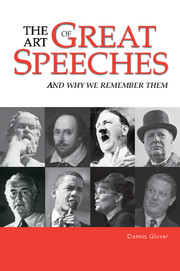Book contents
- Frontmatter
- Contents
- Speeches
- Photographs
- Acknowledgements
- Introduction
- Chapter 1 To save a republic
- Chapter 2 Speech – the essence of democracy
- Chapter 3 Forum
- Chapter 4 Style
- Chapter 5 Emotion
- Chapter 6 Character
- Chapter 7 Evidence
- Chapter 8 Morality
- Chapter 9 Gettysburg
- Chapter 10 Speechwriter
- Conclusion: The ideal orator
- Appendix Common figures and terms
- Notes
- Index
Chapter 10 - Speechwriter
Published online by Cambridge University Press: 05 October 2012
- Frontmatter
- Contents
- Speeches
- Photographs
- Acknowledgements
- Introduction
- Chapter 1 To save a republic
- Chapter 2 Speech – the essence of democracy
- Chapter 3 Forum
- Chapter 4 Style
- Chapter 5 Emotion
- Chapter 6 Character
- Chapter 7 Evidence
- Chapter 8 Morality
- Chapter 9 Gettysburg
- Chapter 10 Speechwriter
- Conclusion: The ideal orator
- Appendix Common figures and terms
- Notes
- Index
Summary
Now we examine the practical question of how a speech gets made.
As we have seen, like most things worth doing, speechwriting involves the mastery of technique. This makes it a skilled trade; but it is a special trade. Think of a carpenter: a competent one can make a chair that will remain upright when you sit on it; a great one can make a chair that will be exhibited in the Guggenheim Museum. Like a great chair a great speech will contain the essential characteristics of art: aspiration towards beauty; passion for the cause; knowledge of the subject. It requires education and belief as well as skill. It also involves a moral standpoint. It has a commercial aspect at times. Writing for diverse clients for a fee is a part of the speechwriter's life – and to the extent that commerce is inescapable and makes the world go around, perfectly justifiable. But that doesn't make speechwriting a morally neutral occupation. Words can be expressed well through the use of technique, but they can never quite be morally separated from the things they argue for. To paraphrase George Orwell, a wall that stands up is a good wall, but if it surrounds a concentration camp, it is an abomination. No speechwriter should ever use words to build such a wall. In fact, as we've seen, some of the greatest speeches are about pulling walls down. The occasional speech for a telephone company or movie studio does no harm, but for a tobacco company? For the major part of their work, speechwriters should be part of the movement they serve. A true speechwriter never writes for the political opposition. Arguing pro and contra is best left for the high school debating team. All of these characteristics – skill, artistry, knowledge, belief and moral purpose – combine to make speechwriting more than a job; they make it a vocation.
- Type
- Chapter
- Information
- The Art of Great SpeechesAnd Why We Remember Them, pp. 228 - 238Publisher: Cambridge University PressPrint publication year: 2010



